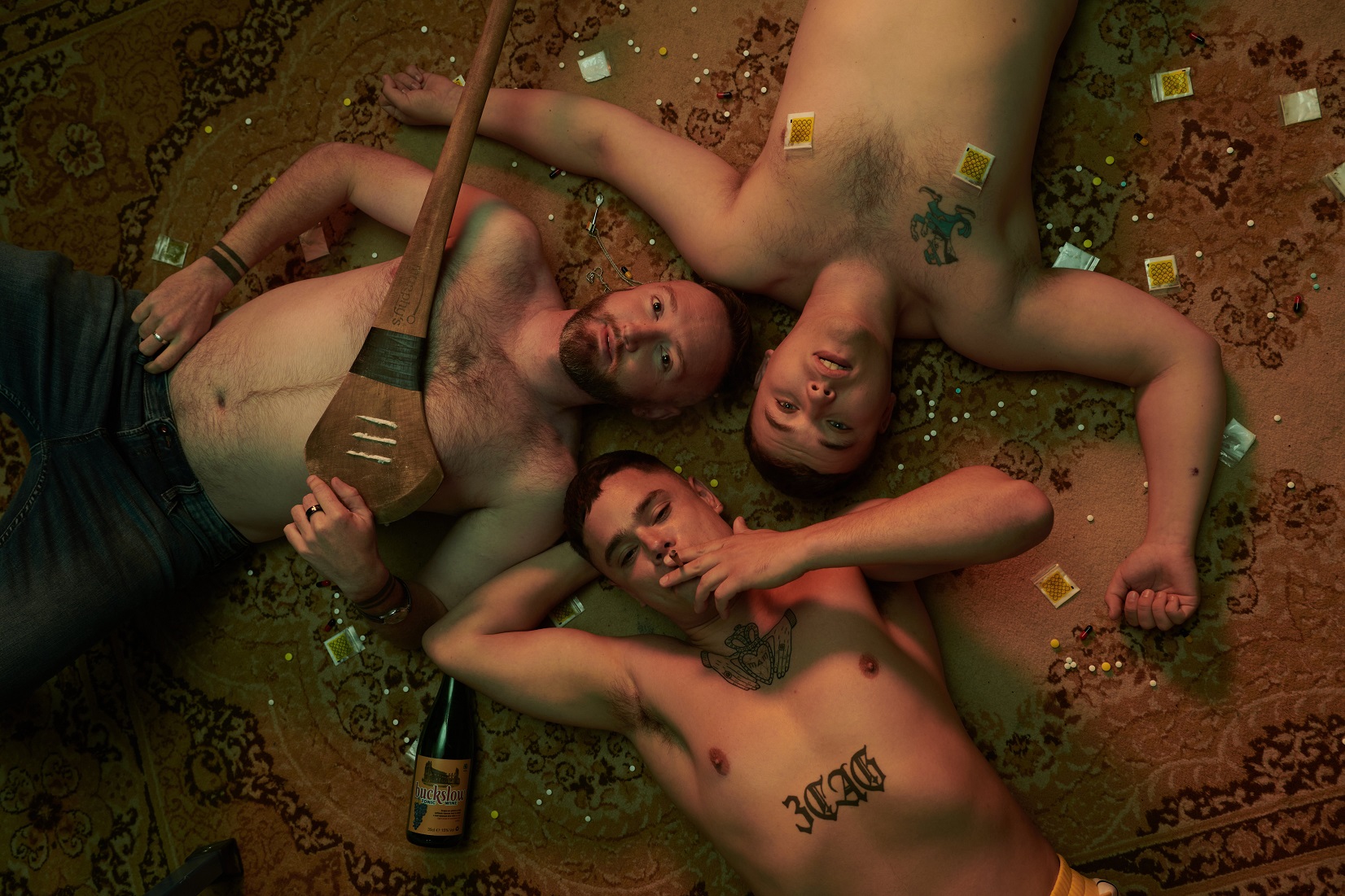
When director Rich Peppiatt first approached the three members of Kneecap, a Belfast hip-hip trio that raps in the Irish language, they weren’t sure what to make of his completely unsolicited pitch to make a feature film about them.
"We were very hesitant," rapper Naoise O Caireallain says. "At first because, well, No. 1 he’s English, and that’s enough for us to be quite sceptical because for a long time the English would profit off the Irish labour.
"Also, we’re the band; we’re Kneecap," he says as bandmate JJ O Dochartaigh looks on. "We’re a real-life band, not a mythical made-up band. And if we made a film that was cringy, everybody else would move on to the next film. We’d still be Kneecap, and if the film was crap, it would be very detrimental to our music careers, I could imagine.
"But thankfully, I think it paid off."
Kneecap, Peppiatt’s biopic of the band, won the Next Audience Award at the Sundance Film Festival in January. In addition to the band members, the cast includes Irish actor Michael Fassbender as O Caireallain’s father, as well as the familiar faces of Irish actors such as Simone Kirby and Josie Walker.
Recently, O Caireallain, O Dochartaigh, and Peppiatt travelled to Los Angeles for a few days to talk about the movie before it opens in theatres.
"We have a WhatsApp group that I set up in December 2019," Peppiatt says. "It’s called ‘Kneecap Go to Hollywood,’ at the time as a joke. That was when I first met them. And flying over, I looked at the group and the date and I was like, ‘That’s crazy.’ We’re flying to LA with the film all this time later.’
"So yeah, that was quite nice at the moment," he says. "We had a little cheers to that."
Peppiatt might never have stumbled on to Kneecap, the movie never made, but for going a little stir-crazy at home in Belfast a few weeks after the birth of his second daughter.
"I needed to get out of the house and have a drink for an hour," he says from a table on a terrace at the London West Hollywood hotel. "I was wandering down the street and saw a sign for Irish hip-hop playing that night and I went.
"I was just blown away by their charisma, their stage presence," Peppiatt says. "It reminded me of my favourite band growing up, Rage Against the Machine, which felt like a political act.
"Often in music, the politics have gone out of it in a way today. Everything was so PR-ed and managed, and it was all career-driven.
"And the idea of having these three lads on stage who were throwing fake bags of drugs into the crowd, and pulling their trousers down with ‘Brits Out’ (written on their bums)," Peppiatt continued. "They didn’t care. It was just that punk energy about that that just connected with me.
"I don’t know whether it was part of me sort of feeling I was in my mid-30s, a father of two now," he says. "Suddenly, there was this something that felt youthful and vibrant, and I was going, ‘I want a bit of that back in my life’."
Peppiatt, who had previously made documentaries and worked in television, knew that the obvious move was to do a documentary on Kneecap, but neither he nor the band wanted to be obvious.
"They were interested in the idea of a narrative feature," he says. "But they’re also very sceptical. Because when somebody approaches you and goes, ‘I want to make a film about you, and you’re going to play yourselves in it’ you kind of go, ‘Uh, really? OK, whatever you say, mate’."
Of course, the idea of making a biopic about a band almost nobody knew outside of Belfast, and maybe just West Belfast at that, might not have been the smartest idea either.
"It made no sense in a way to be making a biopic about a band that’d never released an album, weren’t signed to a record label, rapping in a language that no-one spoke," Peppiatt says. "Why the hell would you make a biopic about these guys?
"But it was so illogical, so stupid and foolhardy, that it actually in its own way came out the other side and was like, ‘Well, that is the very reason to make it, because it’s never been done, right?’," he says. "The minute you go, ‘It’s never been done,’ it’s going to be a disaster or it could be cool."
Kneecap’s name has roots in the Troubles, those three decades of violence between those who wanted the British out of Northern Ireland and those who wanted to maintain British rule. Kneecapping — shooting someone in the knee — was a punishment administered by members of the Irish Republican Army for a range of perceived infractions, such as selling and using drugs, as O Caireallain and O Hannaidh are seen doing in the movie.
Growing up with that history, the members of Kneecap developed a sharp political edge to its songs and performances. As part of the post-Troubles generation, they also sought to be a new voice in Northern Irish youth culture too, the band members say.
"We met organising contemporary Irish-language festivals in Belfast," says O Caireallain, whose stage name, Moglai Bap, is a reference to a boyhood haircut that resembled that of Mowgli from The Jungle Book. JJ used to play pop music in Irish before he embarked on this journey. And Liam Og used to come as a young fellow to the festivals and help us organise them.
"There was a subculture of young people growing up in Belfast who spoke Irish, and we all kind of found each other," he says. "We would go partying together all the time on the weekends, and we noticed that a lot of the terms that exist in English didn’t exist in Irish. Youth culture terms, like terms for drugs and that there."
So they created their own translations, says O Dochartaigh, who performs wearing a balaclava in the tricolours of the Irish flag, and goes by DJ Provai, a reference to the Provisional IRA, which fought to end British rule of Northern Ireland.
"We had words like ‘snaois’," he says. "The old fellas in the bar used to have snuff, so we kind of repurposed that to mean cocaine."
Duidin, the word for a traditional Irish clay pipe, was appropriated to use for a different kind of smoking, O Caireallain adds.
"And it was from that tiny subculture, that tiny movement, that Kneecap was born," he says. "We wanted to let people know that we exist. Because I figured out people probably didn’t know that, No. 1, Irish language isn’t just a funny accent in English, No. 2, that there are young people who speak it.
"December 2017 we put our first track out, C.E.A.R.T.A. — the letters spell the Irish word for ‘rights’," O Caireallain says. "Just, as we say in Ireland, for the ‘craic,’ for fun. We had no intentions of really even being in a band or playing gigs. We had no idea anyone would be interested in hip-hop in Irish."
The song was chosen for a spotlight on an Irish-language radio station but was pulled at the last minute when local politicians caught wind of its drug-fuelled, anti-police lyrics.
"No-one actually listened to it at the start," O Caireallain says of how the song originally was chosen. "They just assumed, ‘Ah, lovely song in Irish, it must be very artsy, and about the green fields of Ireland."
A petition drive ensued, and C.E.A.R.T.A. went viral.
"If you want anything to do good, ban it," O Dochartaigh says. "Sure way to get some promotion for it."
After several months of wooing, Kneecap told Peppiatt they were in.
"We became friendly," O Caireallain says. "He bought us some Guinness, which is the way to any Irishman’s heart. And we just kind of realised he was serious, and he had a plan for us."
Peppiatt, who signed up for Irish-language classes the day after that first night of Guinness, went to work immediately, hunting down development funds and signing up the three rappers — and himself — for six months of acting classes.
"It was a very complicated script," he says. "Lots of different themes. It’s tri-protagonist. I remember realising that and going, ‘I’m going to watch all tri-protagonist films to get a grasp on how structurally people pull it off. Then you realise there aren’t really any, and you go, ‘Oh, that’s a bit ominous.’
"It took quite a while to nail that, particularly because the band themselves were very keen that no-one was a lead character," Peppiatt says. "They were bickering like children about, you know, who’s got more lines? Saying, his lines are a bit more than my lines, he got the best jokes.
"And then the almighty row that occurred when I revealed that Liam Og was going to be the narrator," he adds, laughing. "All, ‘We want to be the narrator, we’ll all be the narrator,’ and me like, ‘That’s not really how narration works, you know’."
To be clear, he’s joking about the difficulty of working with his three-headed protagonist, partly in awe of just how quickly they learned their way around film-making.
The first-time director and cast saw the finished film was when Kneecap screened at Sundance. Suddenly, what had seemed their little project was splashed across the big screen, before an audience of Hollywood movers and shakers.
When that screening ended and the positive reviews poured in, the reality of what they’d done sank in, O Caireallain says.
"Obviously, the movie is colloquial, all that slang and terminology that wouldn’t be quite common in America," he says. "So we weren’t sure. I mean, we had a class film. We love it. But we weren’t sure how it would translate in America.
"As soon as we won the audience award at Sundance, it just kind of relieved all that. We were like, it’s not just something that would be well-received in Ireland, it’s going to be something that’s internationally well-received too."
The film
• Kneecap screens as part of Whānau Marama New Zealand International Film Festival at the Regent Theatre, August 15 at 4pm and August 16 at 8.30pm. — TCA












